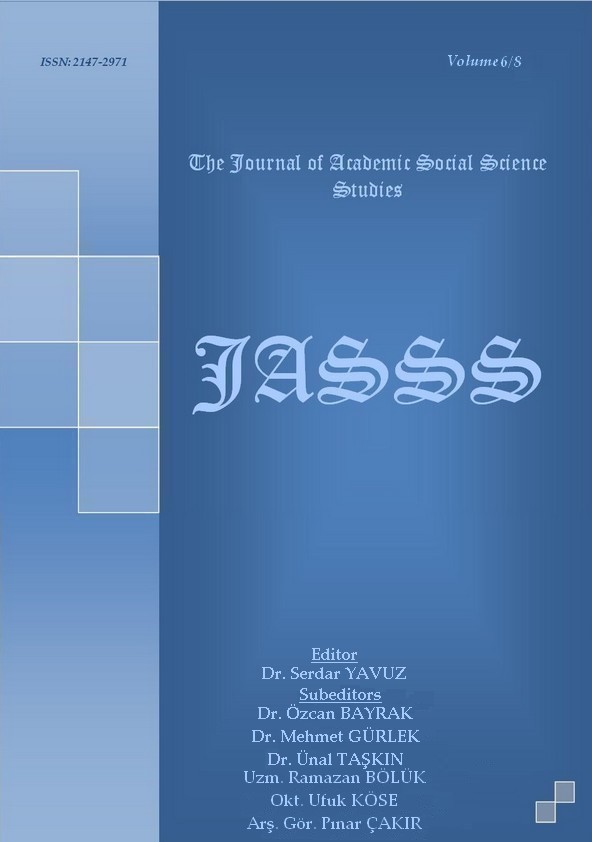Author :
Abstract
Ev halkı anlamına gelen ehl-i beyt terimi, İslâm tarihinde Hz. Peygamber'in aile fertleri için kullanılmıştır. Hz. Peygamber’in şahsına, ailesine sevgi ve saygı duyulması gerektiği, Divan Edebiyatında da önem verilen bir konu olmuştur. Diğer taraftan Kerbelâ vakası olarak da bilinen Hz. Hüseyin’in şehit edilmesini anlatan manzum ve mensur eserler de kaleme alınmıştır. Pek çok şairde olduğu üzere ehl-i beyt sevgisini dile getiren şairlerden biri de Malatyalı Sabrî’dir. Araştırmanın amacı Malatyalı Sabrî’nin
Keywords
Abstract
An Islamic term Ahl-ul-Bayt which means a household is used for the family members of Hz. Muhammed. Love and respect for Prophet himself and his family has been an important issue in Divan literature too. On the other hand, also known as a case of Karbala Hz. Huseyin’s martyrdom in poems and prose works were written. As with many poets who express their love of Ahl-ul-Bayt, one of them is Sabri of Malatya. The aim of the study is to reveal the love of Ahl-ul-Bayt which reflects to the poet’s poetry with the motion of Sabri Divan. It is predicted that Sabri of Malatya had lived between second half of 19th century and first quarter of 20th century. Sabri was related to Kadiriyye tarikat and he wrote sufi poetries. The only existing manuscripts of Sabri Divan is at Süleymaniye Library and registered with the number “Kemal Edip Kürkçüoğlu 48”. The only study about Sabri and his work is belonged to Savran. There are totally 264 poems in Sabri Divan. 242 of them are lyric poems (gazel), 1 is murabba, 1 is muhammes, 3 of them are museddes and 3 of them are in mufred verse format. 14 poems are written in syllabic meter. The love of Ahl-ul-Bayt in Sabri Divan is examined under the headings of Hz. Ali, Hz. Hasan, Hz. Huseyin and Karbala, Yezid and Twelve Imams. Sabri has included poems focusing on virtues and properties of Ahl-ul-Bayt at about 20 places in his
Keywords
- ARSLAN, M. ve ERDOĞAN, M. (2008). Kerbelâ Mersiyeleri. Ankara: Grafiker Yayınları.
- CEBECİOĞLU, E. (2005). Tasavvuf Terimleri ve Deyimleri Sözlüğü. İstanbul: Anka
- CEYHAN, Â. (2006). Türk Edebiyatında Hazret-i Ali Vecizeleri. Ankara: Öncü Kitap.
- ÇAVUŞOĞLU, A. (2004). Ehl-i Beyt Sevgisinin Tercümanları. Marife, 3, 319-340.
- DEMİR, N. (2011). Türk Düşünce Dünyasında Hazret-i Ali. Türk Kültürü ve Hacı Bektaş Velî Araştırma Dergisi, 60, 85-104
- DİYANET İŞLERİ BAŞKANLIĞI, Dînî Kavramlar Sözlüğü. Erişim tarihi: 14.2.2013, http://www.diyanet.gov.tr.
- FIĞLALI, E. R. (1989). Ali. TDV İslam Ansiklopedisi. İstanbul: Türkiye Diyanet Vakfı Yayınları, Cilt 2, 371-374.
- GÜMÜŞKILIÇ, M. (2012). Bir Gazavat-Nâme Etrafında Hz. Ali’nin Halk Muhayyilesindeki Yeri. The Journal of Academic Social Science Studies, 5 (2), 145155.
- KESİK, B. (2011). Usulî Divanında Ehl-İ Beyt Sevgisi. 1. Uluslararası Hacı Bektaş Veli Sempozyumu Bildirileri, Ankara: Hitit Üniversitesi Hacı Bektaş Veli Araştırma ve Uygulama Merkezi, Cilt 1, 345-357.
- ÖZ, M. (1994). Ehl-i Beyt. İslâm Ansiklopedisi. İstanbul: Türkiye Diyanet Vakfı Yayınları, Cilt 10, , 498–501.
- PALA, İ. (1995). Divan Şiiri Sözlüğü. Ankara: Akçağ Yayınları.
- SAVRAN, Ö. (2013). Malatyalı Sabrî Dîvânı. Malatya Valiliği, (Basılacak).
- ŞENTÜRK, A. A. ve KARTAL, A. (2004). Eski Türk Edebiyatı Tarih. İstanbul: Dergâh
- ULUDAĞ, S. (1989). Âl-i Âbâ. İslâm Ansiklopedisi. İstanbul: Türkiye Diyanet Vakfı Yayınları, Cilt 2, 305–306.
- UZUN, M. (2002). Türk Edebiyatında Kerbelâ. İslâm Ansiklopedisi. Ankara: Türkiye Diyanet Vakfı Yayınları, Cilt 25, 274-275.
- ÜNVER, M. (2006). Nesimî’de Ehl-i Beyt Sevgisi. I. Uluslararası Seyyid Nesimî Sempozyumu Bildirileri (17-19 Haziran 2005). Haz.: Gülağ Öz, 226-241, Ankara: Hüseyin Gazi Vakfı Yayınları.
- ÜZÜM, İ. (1998). Hüseyin. İslâm Ansiklopedisi. Ankara: Türkiye Diyanet Vakfı Yayınları, Cilt 1, 521-524.
- VAROL, B. (2011). Hz. Hasan ve Hz. Hüseyin. Diyanet Aylık Dergisi, 250, 62-64.





